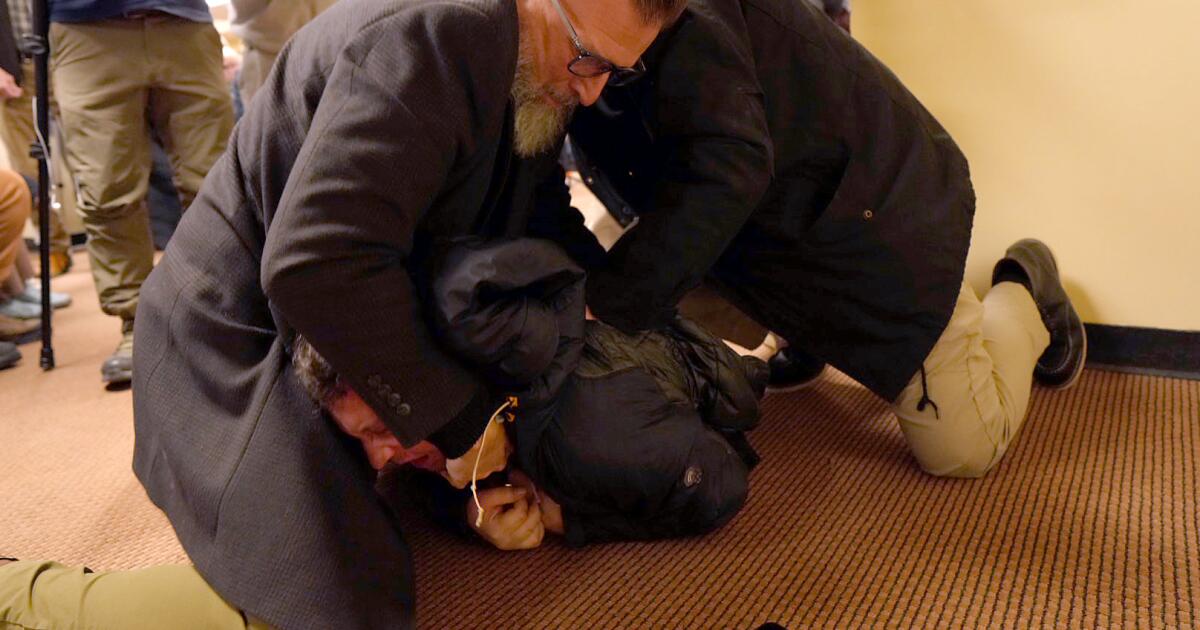Man who squirted vinegar on Omar charged with assault and intimidation
MINNEAPOLIS — The Justice Department has charged a man who squirted apple cider vinegar on Democratic U.S. Rep. Ilhan Omar at an event in Minneapolis, according to court papers made public Thursday.
The man arrested for Tuesday’s attack, Anthony Kazmierczak, faces a charge of forcibly assaulting, opposing, impeding and intimidating Omar, according to a complaint filed in federal court.
Authorities determined that the substance was water and apple cider vinegar, according to an affidavit. After Kazmierczak sprayed Omar with the liquid, he appeared to say, “She’s not resigning. You’re splitting Minnesotans apart,” the affidavit says. Authorities also say that Kazmierczak told a close associate several years ago that “somebody should kill” Omar, court documents say.
It was unclear whether Kazmierczak had an attorney who could comment on the allegations. A message was left with the federal defender’s office in Minnesota.
The attack came during a perilous political moment in Minneapolis, where two people have been fatally shot by federal agents during the White House’s aggressive immigration crackdown.
Kazmierczak has a criminal history and has made online posts supportive of President Trump, a Republican.
Omar, a refugee from Somalia, has long been a target of Trump’s anti-immigrant rhetoric. After she was elected seven years ago, Trump said she should “go back” to her country. He recently described her as “garbage” and said she should be investigated. During a speech in Iowa this week, shortly before Omar was attacked, he said immigrants need to be proud of the United States — “not like Ilhan Omar.”
Omar blamed Trump on Wednesday for threats to her safety.
“Every time the president of the United States has chosen to use hateful rhetoric to talk about me and the community that I represent, my death threats skyrocket,” Omar told reporters.
Trump accused Omar of staging the attack, telling ABC News, “She probably had herself sprayed, knowing her.”
Kazmierczak was convicted of felony auto theft in 1989, has been arrested multiple times for driving under the influence and has had numerous traffic citations, Minnesota court records show. There are also indications he has had significant financial problems, including two bankruptcy filings.
In social media posts, Kazmierczak criticized former President Biden and referred to Democrats as “angry and liars.” Trump “wants the US … stronger and more prosperous,” he wrote. “Stop other countries from stealing from us.”
In another post, Kazmierczak asked, “When will descendants of slaves pay restitution to Union soldiers’ families for freeing them/dying for them, and not sending them back to Africa?”
Threats against members of Congress have increased in recent years, peaking in 2021 after the Jan. 6 attack on the U.S. Capitol by a mob of Trump supporters before dipping slightly, only to climb again, according to the most recent figures from the U.S. Capitol Police.
Officials said they investigated nearly 15,000 “concerning statements, behaviors, and communications directed against Members of Congress, their families, staff, and the Capitol Complex” in 2025.
Richer and Karnowski write for the Associated Press. Richer reported from Washington.
